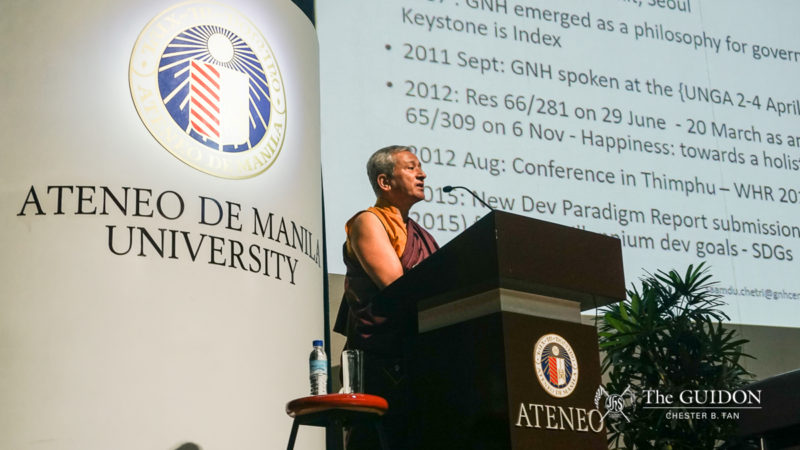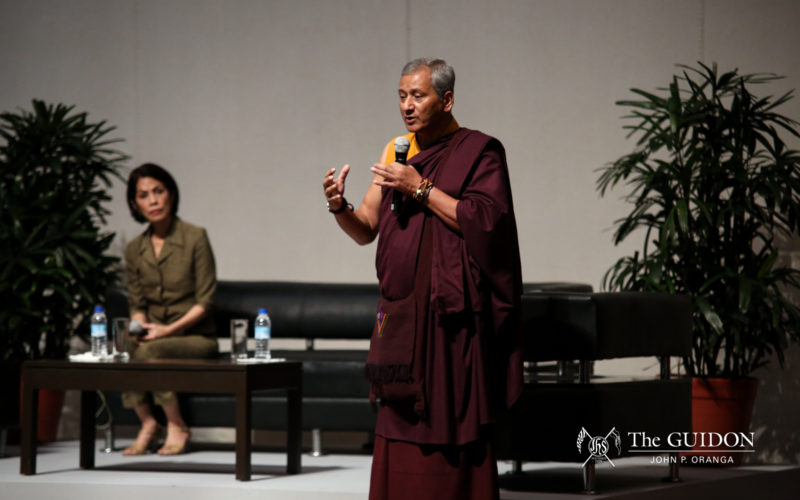PRESENTING AN alternative approach in measuring a country’s development, the Ateneo de Manila University and the Department of Environment and Natural Resources (DENR) held a lecture on “Gross National Happiness” (GNH) at the Henry Lee Irwin Theatre on October 22.
Executive Director of Bhutan’s GNH Center Dr. Saamdu Chetri led the discussion on the relationship between the well-being of a country’s citizens along with its available resources through an in-depth look of GNH.
DENR Secretary Regina Lopez was also present at the lecture to discuss government initiatives regarding the maneuvering of natural resources in the country as a means to alleviate poverty.
Gross National Happiness
The Gross National Happiness metric was first developed in the 1970s by the 4th King of Bhutan Jigme Singye Wangchuck. The metric suggests sustainable growth can be achieved by prioritizing people’s needs rather than their wants.
During the forum, Chetri, Bhutan’s “Happiness Guru”, said that compared to the 2010 GNH Index of 0.743%, the 2015 GNH Index went up reached 0.756%.
Chetri said that to be able to feel “true happiness,” one should learn how to serve others, keep their values in check, and live in harmony with nature.
He added that the growing severity of climate change and its effects on people and the rest of the world was his main concern. He encouraged the audience to care for nature and live not only for themselves, but also for the generations to come.
“The more we kill nature, the faster we kill ourselves. We are 100% connected to nature so we should learn to serve and love nature”, he said.

An alternative to GDP
According to Chetri, Gross National Happiness also reveals the reasons why people are unhappy. He said a possible reason behind people’s unhappiness is one’s income.
In 2012, the Philippines Statistics Authority (PSA) revealed that there are 4.2-M households in the country that fall under the category of “Poor”, while there are only 150,000 households in the country that are classified as “Rich”. The “Middle Class”, however, is composed of 17.1-M households.
Chetri, however, said he is not delighted with the increase in the number of “Middle Class” households. He said that the higher the gap between the rich and poor, the less happiness and satisfaction will be felt by people.
Chetri also noted that because most countries aim for economic growth and development based on Gross Domestic Product and Gross National Product, countries fail to address “things that actually matter”.
“‘GDP measures everything except that which makes life worthwhile.’ So we shouldn’t stay on this development paradigm. We measure our success on mere accumulation of material but then comes air pollution and [other] byproducts of a faster economy,” he said.
He said that the focus should not be on “fulfilling wants but simply one’s needs”.
Lopez also explained that the goal of development shouldn’t focus on material accumulation, but instead, on the idea of happiness.
“We should recognize that the end goal should be happiness. People are a significant key component of the environment – we are not material beings. It is critical that we [realize] this because we otherwise cut ourselves short,” she said.
She said that the DENR is exploring and developing the adoption an area management paradigm to maneuver national resources to help people out of poverty.

GNH in the Philippines
Chetri called the Philippines to move towards a more GNH-inclined perspective on the country’s development especially given the growing decline of the environment in the city’s progress.
“I think that the Philippines is very capable of pursuing GNH and applying the idea of [taking] societal happiness as a lens to view human progress,” Chetri said.
According to Lopez, the DENR is looking into planting more trees in urban centers in the Philippines.
“There are trees whose roots grow downwards. We are looking to utilize that to perhaps include more of the environment into the urban landscape,” she said.








Hi good evening!
May I ask a little favor from you? Can you help me have a connection from his team? I’m working in a publishing company. Thank you so much!